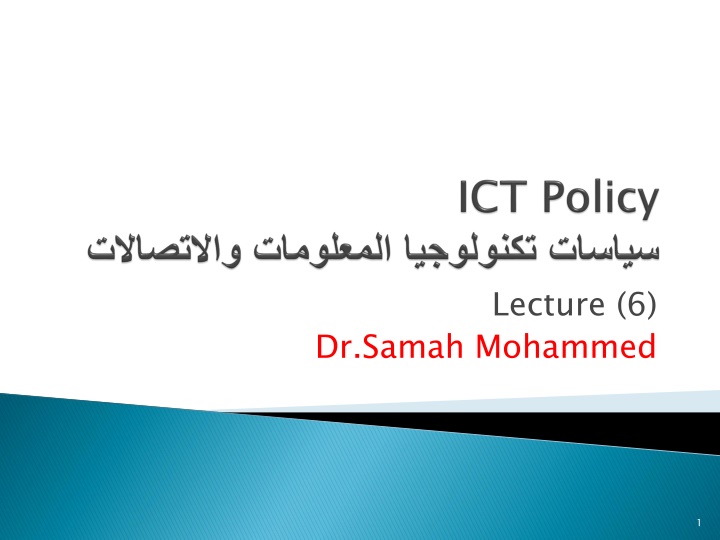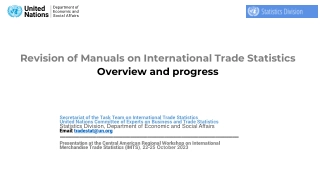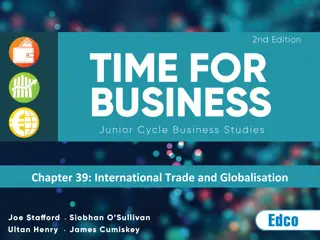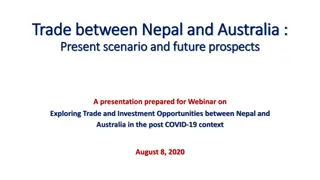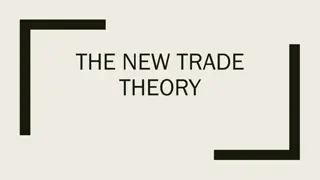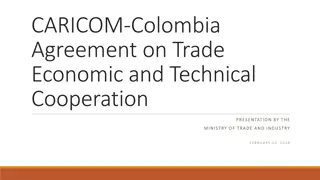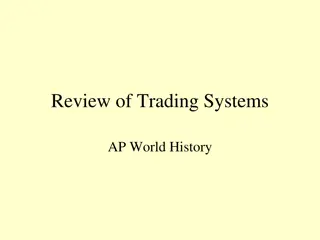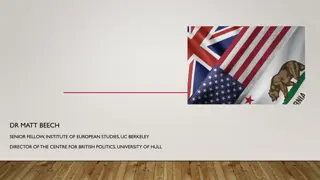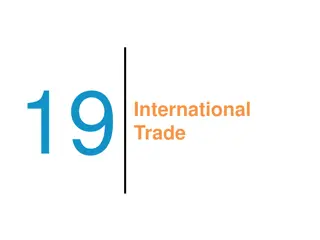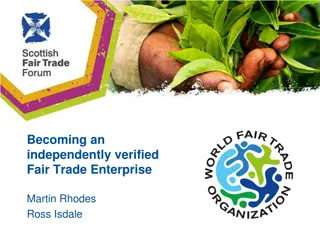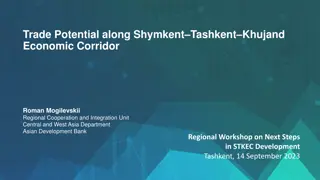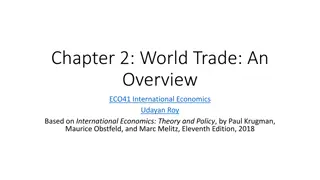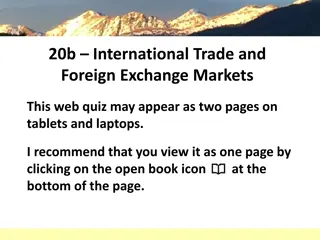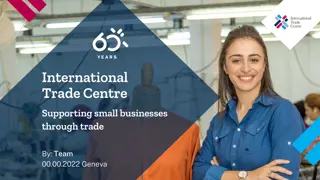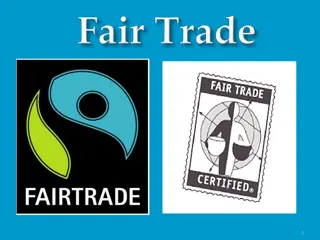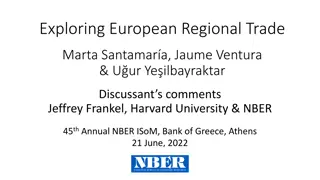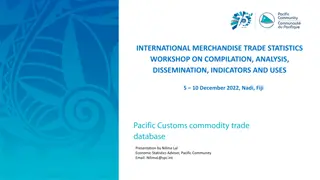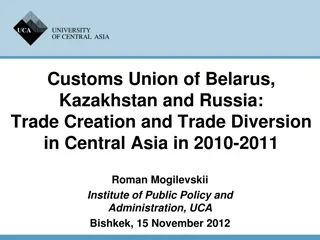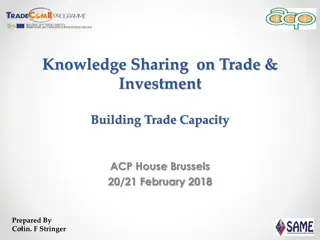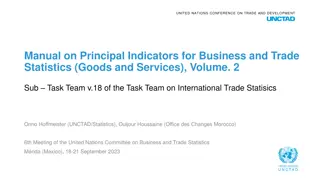The World Trade Organization
The World Trade Organization (WTO) is an international agency that oversees global trade rules and agreements among nations. This includes addressing issues such as telecommunications, agriculture, textiles, and intellectual property rights. The WTO plays a crucial role in supporting trade negotiations, resolving disputes, and assisting developing countries with trade policies. Explore the key functions and importance of the WTO in shaping international trade relations.
Download Presentation

Please find below an Image/Link to download the presentation.
The content on the website is provided AS IS for your information and personal use only. It may not be sold, licensed, or shared on other websites without obtaining consent from the author.If you encounter any issues during the download, it is possible that the publisher has removed the file from their server.
You are allowed to download the files provided on this website for personal or commercial use, subject to the condition that they are used lawfully. All files are the property of their respective owners.
The content on the website is provided AS IS for your information and personal use only. It may not be sold, licensed, or shared on other websites without obtaining consent from the author.
E N D
Presentation Transcript
Lecture (6) Dr.Samah Mohammed 1
The WTO is an international agency that deals with the global rules of trade between nations; telecommunications and internet services have taken on increased importance within its trade agenda. There are total 153 counted in the year 2011. Currently there are total 629 are present in WTO. 153 member countries was 629 staff members 2
WTO day-to-day business is conducted by the General Council, which is composed of representatives of all WTO members (http://www.wto.org). The WTO administers task:- 1) Trade agreements. 2) supports negotiations 3) rules on trade disputes, and 4) Assists developing countries on trade policy issues through technical assistance 5) Training. 3
Agriculture :- The agreement relating to agriculture is made up of several elements, which seek to reform trade in agriculture. Health and Safety Measures:- The agreement on the application of Sanitary and Phytosanitary Measures concerns the application of food safety and animal and plant health regulation. 4
Textiles and Clothing:- The objective of this agreement is to secure the integration of the textile and clothing sector . TRIPS :- The WTO agreements of trade related aspects of intellectual property rights (TRIPs) recognizes that widely varying standards in the protection and enforcement of intellectual property rights and the lack of multilateral disciplines dealing with international trade in counterfeit goods. 5
TRIMS:- Trade related Investment Measures (TRIMs) are those restrictions a nation places on foreign investment that adversely affect trade in goods and services. Disputes Settlement:- The Dispute Settlement Understanding(DSU) is the legal text that spells out the rules and procedures for disputes between member countries 6
The World Bank Group plays a major role in defining the global agenda for development. WB has been instrumental in identifying progress towards market liberalisation as a key determinant of development. WB has also led efforts to link national ICT policies with poverty reduction strategies as a means of promoting progress towards the UN s Millennium Development Goals (MDGs). 7
The WB also has access to extensive technical resources, which allow it to develop definitive positions on the regulatory and technical issues involved in ICT and internet policy and program development. The WB is governed by a Board, which includes all its members; it is important to know that decisions are taken by majority vote with voting rights determined by the number of stocks held in the Bank. 8
The World Economic Forum is a private organisation that provides a shared framework for world leaders to address global issues and promotes entrepreneurship in the global public interest. The WEF s convening power makes it an influential voice in the establishment of global policies on ICT issues. 9
Civil society is developing its own powerful voices to balance the more fixed authority of the organizations described above. The APC is the premier organization articulating civil society s position on ICT policy issues but it is increasingly strengthened by the recognition that related international NGOs are giving to ICT issues. 10
The APC is a non-profit association of member and partner networks around the world, committed to making the internet serve the needs of global civil society. APC has developed a number of tools to build capacity within civil society to address ICT policy issues and ensure that its views are heard in global debate. 11
GIPI the Global Internet Policy Initiative serves as a resource to local stakeholders in the internet policy development process. CPSR Responsibility is a public-interest alliance of computer scientists and others concerned about the impact of computer technology on society. EFF pioneering donor-supported membership organization working to protect fundamental rights regardless of technology. CPSR Computer Professionals for Social EFF the Electronic Frontier Foundation is a 12
Many regional and sub-regional organizations with a development mandate have staked out roles with respect to information society, ICT or internet policy. The European Union has developed the concept of Europe as part of its strategy to grow a knowledge-based economy and increase employment and social cohesion. The eEurope framework is guiding the e- strategies of countries that are candidates for EU membership. 13
The African, Asian and Inter-American Development Banks16 provide financial and technical assistance for the establishment, expansion, improvement and integration of public telecommunications systems. Expanding access to telecommunications services, improving the contribution of the telecommunications sector to economic growth. 14
provides a forum for African governments. improving access to information infrastructure . promoting its use as a tool for stimulating economic development and enhancing poverty reduction. 15
The United Nations Economic Commission for Africa (UNECA), within its African Information Society Initiative;- 1) Provides advice on information policy to member states, 2) stimulates regional debate, and 3) promotes Africa s voice within global debate. 16
We should not forget that the private sector plays a key role in setting ICT policy. This may be through:- 1) Direct or indirect influence in organisations such as the ITU or the WTO. 2) Participation in technical standards bodies for the internet. 3) Employers federations individual companies which lobby. 4) Actions in the courts to enforce existing laws or to create precedents. or even ) ( 17
